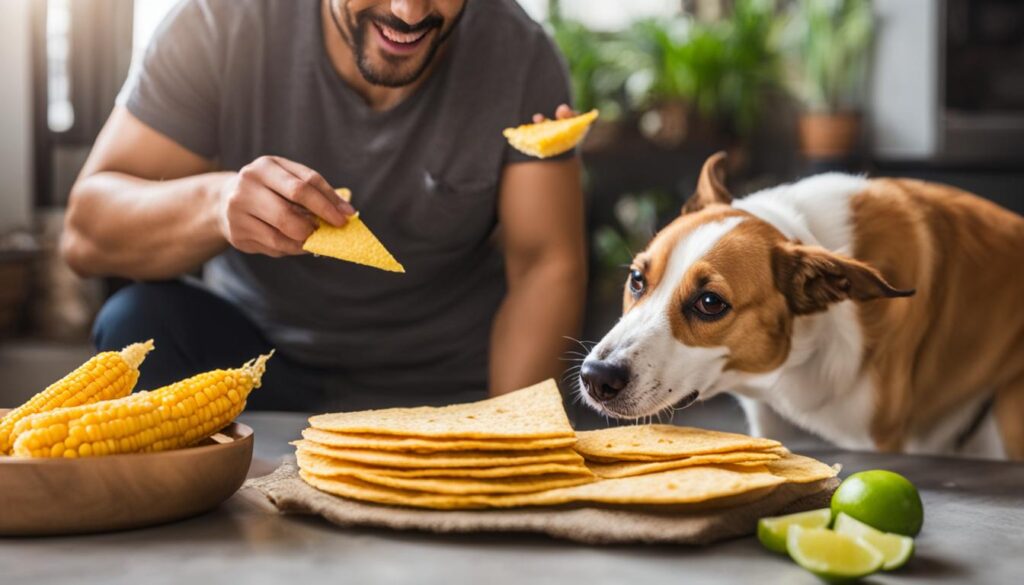Can Dogs Eat Corn Tortillas? Discover the Facts.
If you’re a dog owner, you may have wondered if it’s safe to share some of your favorite foods with your furry friend. One common question that arises is whether dogs can eat corn tortillas. Let’s uncover the facts and find out if corn tortillas are a suitable treat for your canine companion.
Corn tortillas can be safe for dogs to consume in moderation. They contain carbohydrates, fiber, vitamins, and antioxidants, which can provide nutritional benefits for your pet. However, it’s important to keep in mind that feeding them in excess can lead to digestive issues and weight gain in dogs. Therefore, moderation is key.
When offering corn tortillas to your dog, it’s crucial to choose plain tortillas without any toppings or fillings. Avoid adding spices, onions, garlic, or any other ingredients that could be harmful to your pet. Serving the tortillas in small, bite-sized pieces can make it easier for your dog to eat and digest.
Before introducing corn tortillas into your dog’s diet, it’s always a good idea to consult with your veterinarian. They can provide personalized advice based on your dog’s specific dietary needs and any underlying health conditions.
Key Takeaways:
- Corn tortillas can be safe for dogs to consume in moderation, as they contain carbohydrates, fiber, vitamins, and antioxidants.
- Feeding excessive amounts of corn tortillas can lead to digestive issues and weight gain in dogs.
- Choose plain corn tortillas without any toppings or fillings, and serve them in small, bite-sized pieces.
- Consult with a veterinarian before introducing corn tortillas into your dog’s diet, as they can provide personalized advice based on your dog’s specific needs.
- Remember to always prioritize your dog’s overall balanced diet and consider alternative healthier food options.
The Ingredients and Benefits of Tortillas for Dogs
When it comes to feeding your dog, it’s important to understand the ingredients and benefits of the food you offer. Here, we will explore the components of tortillas and the advantages they can provide to your furry friend.
Ingredients in Corn Tortillas
Corn tortillas, a popular type of tortilla, contain several key ingredients:
- Corn: Corn is a rich source of proteins, carbohydrates, and linoleic acid, which is essential for a dog’s overall health. It also contains antioxidants that support the immune system.
- Whole Wheat: Whole wheat adds complex carbohydrates and dietary fiber to tortillas. These nutrients contribute to improved energy metabolism and digestion in dogs.
- Salt: Salt, when consumed in moderation, is generally safe for dogs. It can enhance the flavor of tortillas without posing significant health risks.
By incorporating these ingredients, corn tortillas can provide a balanced nutritional profile for your dog, offering various health benefits.
Benefits of Corn Tortillas for Dogs
The combination of ingredients in corn tortillas can promote your dog’s well-being in several ways:
- Improved Energy Metabolism: The carbohydrates from corn and whole wheat provide your dog with sustained energy, ensuring they stay active and vibrant.
- Muscle Repair: The proteins found in corn tortillas support muscle repair and maintenance, which is essential for active dogs or those recovering from physical exertion.
- Enhanced Digestion: The dietary fiber in whole wheat aids in digestion, preventing constipation and promoting a healthy digestive system.
- Immune System Support: The antioxidants in corn can bolster your dog’s immune system, helping them fight off harmful pathogens and reducing the risk of certain diseases.
Remember, while corn tortillas can provide these benefits, they should only be part of your dog’s diet in moderation. Feeding tortillas to your dog should not become a regular habit or replace balanced dog food.
| Corn Tortillas | Whole Wheat Tortillas | |
|---|---|---|
| Gluten-Free | Yes | No |
| Ease of Digestion | High | Can be more challenging for dogs with gluten allergies or sensitive stomachs |
| Key Nutrients | Proteins, carbohydrates, linoleic acid, antioxidants | Complex carbohydrates, dietary fiber |

Moderation and Quantity: How Much Tortilla is Good for Dogs?
Tortillas can be a tasty treat for your furry friend, but it’s important to ensure that they are fed in moderation. Feeding corn tortillas to dogs should be done sparingly and in small quantities to prevent any potential health issues.
Experts recommend feeding dogs 1-2 small pieces of tortilla once a week. This serves as a guideline to maintain a balanced diet for your canine companion. By limiting the frequency and portion size, you can enjoy sharing this snack with your dog while also keeping their overall health in mind.
Feeding excessive amounts of tortillas to dogs can lead to various health problems. One of the main concerns is weight gain, which can increase the risk of issues such as obesity, diabetes, and heart disease. Additionally, consuming large quantities of tortillas may cause digestive issues like constipation or upset stomach.
It’s crucial to remember that tortillas should not replace your dog’s regular meals. They should only be an occasional treat or addition to their diet. By practicing moderation and portion control, you can ensure that your dog enjoys the occasional tortilla without compromising their health.

Feeding tortillas to dogs in moderation is key to their overall health and well-being.
Corn Tortillas vs. Wheat Tortillas: Which is Better for Dogs?
When it comes to choosing between corn tortillas and wheat tortillas for your furry friend, there are a few factors to consider. Corn tortillas are generally a better option for dogs compared to wheat tortillas.
Firstly, corn tortillas are gluten-free, making them easier for dogs to digest. Dogs with gluten allergies or sensitive stomachs may not tolerate wheat tortillas as well. By opting for corn tortillas, you can minimize the risk of digestive issues and discomfort for your canine companion.
Corn tortillas also offer essential nutrients that are beneficial to dogs. They contain proteins, carbohydrates, and antioxidants, which support overall health and well-being. Additionally, corn tortillas can be a good source of energy for your dog.
To help you visualize the comparison between corn tortillas and wheat tortillas, here’s a handy table:
| Corn Tortillas | Wheat Tortillas |
|---|---|
| Gluten-free | Contain gluten |
| Easy to digest for dogs | May cause digestive issues for dogs with gluten allergies or sensitivities |
| Contain essential nutrients like proteins, carbohydrates, and antioxidants | Also provide some nutrients, but may not be as easily digested |
Keep in mind that every dog is unique, so it’s important to consider your dog’s individual dietary needs and consult with a veterinarian. They can provide personalized advice based on your dog’s health, allergies, and specific requirements.
When introducing tortillas into your dog’s diet, it’s crucial to practice moderation. While corn tortillas can be a part of a balanced diet, they should not be the sole focus. Offer them as an occasional treat and not as a regular meal replacement. Remember to serve plain tortillas without any toppings or fillings that may be harmful to dogs.
In conclusion, when deciding between corn tortillas and wheat tortillas for dogs, corn tortillas are generally a better option due to their gluten-free nature and easier digestibility. However, always prioritize your dog’s health and consult with a professional for personalized advice.
Feeding Tortillas to Dogs Safely
When it comes to feeding tortillas to your furry friend, it’s essential to prioritize their safety and well-being. By following a few simple guidelines, you can ensure that your dog enjoys tortillas without any risks to their health.
- Moderate the Quantity: Feeding tortillas to dogs should be done in moderation. While they can be a tasty treat, excessive consumption can lead to health issues such as constipation, weight gain, and even diabetes. It’s best to offer tortillas as an occasional indulgence rather than a staple in their diet.
- Avoid Processed Tortillas: Commercial tortillas often contain preservatives and additives that can be harmful to dogs. It is recommended to choose plain tortillas without any added seasonings or fillings. These simple tortillas are safer for your dog’s digestive system and overall health.
- Consider Safe Ingredients: The ingredients used in the tortilla wrap are crucial to ensure your dog’s safety. It’s important to avoid using onions, garlic, and spicy sauces, as these ingredients can be toxic to dogs. Stick to plain tortillas or make them at home using dog-safe ingredients.
- Opt for Homemade Tortillas: The safest way to feed tortillas to dogs is by making them at home. By doing so, you can control the ingredients and avoid any potential allergens or harmful substances. Homemade tortillas can be a healthy and enjoyable treat for your pup.
If you’re planning to make tortillas for your dog, ensure they are fresh, without any added cheese, butter, or other toppings. This will further enhance their safety and promote a balanced diet.
Remember, tortillas should not replace a complete and balanced canine diet. While they can be a delightful occasional treat, it’s essential to prioritize your dog’s overall nutritional needs. Consult with your veterinarian to determine the best approach for incorporating tortillas into your dog’s diet.

| Feeding Tortillas to Dogs Safely | Summary |
|---|---|
| Moderate the Quantity | Feeding tortillas in moderation prevents digestive issues and weight gain. |
| Avoid Processed Tortillas | Commercial tortillas often contain harmful additives and preservatives. |
| Consider Safe Ingredients | Avoid onions, garlic, and spicy sauces, which can be toxic to dogs. |
| Opt for Homemade Tortillas | Making tortillas at home allows you to control the ingredients and ensure their safety. |
Risks of Excessive Tortilla Consumption for Dogs
If a dog consumes an excessive amount of tortilla, it can lead to various health risks. It’s important to be aware of the potential consequences and take precautions to prevent these issues from arising.
Eating too much tortilla can result in:
- Constipation: The high levels of carbohydrates in tortillas can cause digestive issues and lead to constipation in dogs.
- Increased heart rate: Excessive consumption of tortilla can cause an increase in heart rate due to the high salt content.
- Obesity: Tortillas are calorie-dense and can contribute to weight gain if consumed in large quantities, leading to obesity in dogs.
- Diabetes: As tortillas contain carbohydrates, overeating can lead to an increase in blood sugar levels, potentially triggering diabetes in dogs.
- Heart disease: Dogs that consume too much tortilla may be at a higher risk of developing heart disease due to the excess sodium in the tortilla.
- Upset stomach: Overindulging in tortilla can cause an upset stomach, resulting in discomfort and potential digestive issues for your dog.
- Vomiting and diarrhea: If a dog eats too much tortilla, it can upset their stomach, leading to vomiting and diarrhea.
- Allergies: Some dogs may be allergic or sensitive to certain ingredients in tortillas, such as corn or wheat, which can cause allergic reactions.
- Unwanted eating habits: Feeding excessive amounts of tortilla can create a habit of overeating and encourage begging behavior in dogs.
- Dehydration: Tortillas often contain salt, which can lead to dehydration if consumed excessively by dogs.
It’s crucial to monitor your dog for any symptoms or adverse reactions after consuming tortillas. If you notice any concerning signs or your dog experiences health issues, it’s essential to contact a veterinarian for guidance.
Conclusion
While corn tortillas can be enjoyed by dogs in moderation, it is important to remember that they should not be a staple in their diet. Feeding dogs excessive amounts of corn tortillas can lead to various health issues and unwanted weight gain. Therefore, it is crucial to practice moderation and provide them with a balanced diet.
When choosing tortillas for your furry friend, opt for plain corn tortillas without any added toppings or fillings. Processed or flavored varieties may contain ingredients that are harmful to dogs. Additionally, tortillas should be served in small quantities and as occasional treats rather than a regular part of their meals.
While corn tortillas can be a part of a healthy canine diet, there are also other nutritious food options to consider. Fruits, seafood, beans, vegetables, and certain nuts can provide dogs with a wide range of essential nutrients. It is always a good idea to consult with a veterinarian for specific dietary advice tailored to your dog’s individual needs.
Remember, the key to ensuring your dog’s well-being is to provide a balanced and varied diet. While corn tortillas can be a tasty treat for your furry companion, it is essential to feed them in moderation and prioritize their overall canine health.
FAQ
Can dogs eat corn tortillas?
Corn tortillas can be safe for dogs to consume in moderation. However, it’s important to choose plain tortillas without any toppings or fillings and serve them in small, bite-sized pieces. Consult with a veterinarian before introducing corn tortillas into your dog’s diet.
What are the ingredients and benefits of tortillas for dogs?
Corn tortillas contain proteins, carbohydrates, linolic acid, and antioxidants from corn. Whole wheat tortillas act as a source of complex carbohydrates and dietary fiber. These ingredients can offer benefits like improved energy metabolism, muscle repair, digestion, and immune system support. However, tortillas should be fed in moderation and not be a regular part of a dog’s diet.
How much tortilla is good for dogs?
Tortillas should be fed to dogs in moderation. The recommended quantity is 1-2 small pieces once a week. Feeding excessive amounts of tortillas can lead to health issues like constipation, obesity, diabetes, and heart disease. It’s important to control the portion size and frequency of feeding tortillas to dogs to maintain a balanced diet and prevent weight gain.
Are corn tortillas or wheat tortillas better for dogs?
Corn tortillas are generally a better option for dogs compared to wheat tortillas. Corn is gluten-free and easier for dogs to digest. It contains essential nutrients like proteins, carbohydrates, and antioxidants. Wheat tortillas may not be suitable for dogs with gluten allergies or sensitive stomachs. Consult with a veterinarian to determine the best option for your dog’s dietary needs.
How can I safely feed tortillas to my dog?
When feeding tortillas to dogs, it’s important to follow certain safety guidelines. These include moderating the quantity, avoiding processed tortillas with preservatives, and ensuring that the ingredients used in the tortilla wrap are safe for dogs to consume. Onions, garlic, and spicy sauces should be avoided. The safest way to feed tortillas to dogs is to make them at home without any added cheese or butter and serve them fresh.
What are the risks of excessive tortilla consumption for dogs?
If a dog consumes an excessive amount of tortilla, it can lead to health risks such as constipation, increased heart rate, obesity, diabetes, heart disease, upset stomach, vomiting, diarrhea, allergies, unwanted eating habits, and dehydration due to salt consumption. Monitor your dog for any symptoms and contact a veterinarian if any adverse reactions or health issues occur.
Can corn tortillas contribute to canine health?
Corn tortillas can contribute to canine health when fed in moderation. They contain carbohydrates and nutrients like fiber, vitamins, and antioxidants. However, they should not be a staple in a dog’s diet. It’s important to consult with a veterinarian for specific dietary advice for your dog and consider other healthier food options like fruits, seafood, beans, vegetables, and certain nuts.

